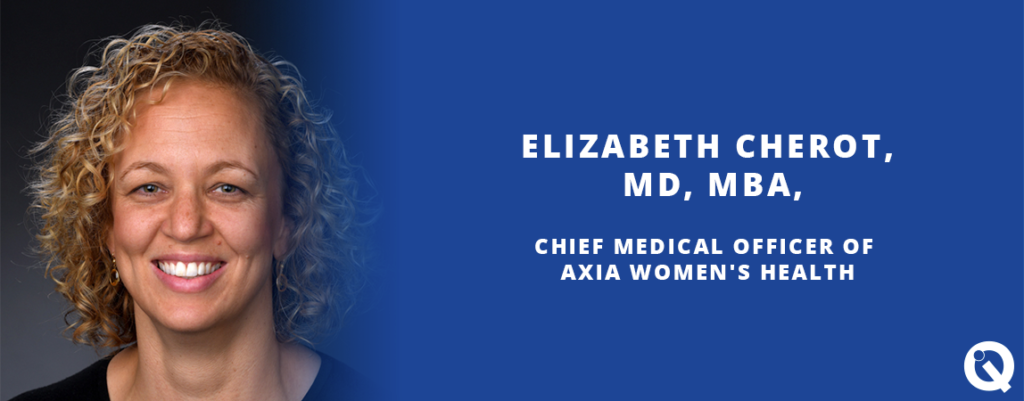Elizabeth Cherot, MD, MBA, Chief Medical Officer of Axia Women’s Health, a member of the Quality Institute’s Provider Council. The Axia network includes OB/GYN physicians and other women’s health providers in five states, including New Jersey.
What advice about the COVID-19 vaccine are you providing to your patients who are pregnant?
The American College of Obstetrics and Gynecology (ACOG) recommends that the COVID-19 vaccine not be withheld from pregnant individuals who meet the criteria for vaccination. The Advisory Committee on Immunization Practices (ACIP) of the Centers for Disease Control (CDC) recommends groups that should be prioritized. It is really important for patients to talk to their providers, specifically their OBGYN providers, to see if they meet the criteria, as well as to talk about the decision to be vaccinated. Right now, the level of the virus in New Jersey is high; the risks and the potential severity of maternal disease affecting both the fetus and the newborn should be discussed along with the safety of the vaccine for pregnant patients. Patients may want to discuss if thier risk for serious COVID illness is higher because of conditions, such as obesity or diabetes.
The vaccine was not specifically tested in pregnant women, even though ACOG and others pleaded for studies to be done on pregnant women. But we do have data from health care workers and others who have been vaccinated who later became pregnant and were followed. They had the expected side effects. It is important to note that the COVID-19 vaccine is not a live, attenuated vaccine, such as what we see in the rubella vaccine. There is a different science behind the mRNA vaccines, such as the coronavirus vaccine. Additionally, there is no need for a pregnancy test before receiving the vaccine.
This is an important conversation for everyone to have with their doctor — and discussions might be different if you are, say, an ICU nurse or if you are a healthy person who is working completely from home. But we need to vaccinate to be able to stop the spread of COVID-19. And the vaccine should not be withheld from pregnant woman.
What about patients who are breastfeeding their babies?
It is a very similar conversation when it comes to breastfeeding. The vaccine should be offered to breastfeeding individuals in the same way the vaccine is offered to non-breastfeeding individuals. If you are a health care worker or a frontline worker and you are offered the vaccine, it should not be withheld because you are breastfeeding. The CDC recommends you receive the vaccine. As the vaccine opens up to more people who are not frontline workers, the same questions are going to come up — and the recommendations will be the same.
How has COVID-19 changed how you practice prenatal care?
We encourage our patients to remain safe through social distancing, wearing masks, and washing hands, etc. And in our offices, we have strict protocols. Deep cleaning on all surfaces, and patients waiting in their cars so there is no one in the waiting rooms. We are not allowing support people inside for visits or ultrasounds to limit the amount of people in the office. We have also moved some visits to telehealth. And we are super excited to begin the pilot of a remote, fetal monitoring device in New Jersey in February. INVU™ is a prescribed, remote monitoring platform that mom’s wear to detect their heart rate and the fetal heart rate.
What innovations, as a result of COVID-19, will you potentially adapt long-term?
We are experiencing an innovative time in health care, and I love innovation. The innovation of telemedicine in the OBGYN space has mostly focused on counseling, such as prescribing birth control, but now we are doing so much more with telehealth. And I think it is here to stay. Providers love it…patients love it. We are doing so much more with telehealth within Axia than we did at the beginning of the pandemic. You are basically meeting a patient in their home and obtaining a whole new insight into who they are and what their needs are. A lot of OB care is having conversations and communicating. We are doing blood pressures at home, weight at home, and there will be new “wearables.” It will be a true virtual visit, which is amazing. Over the summer, we partnered with the Henry Ford Healthcare System in Detroit on a validation trial on a new wearable device for fetal monitoring visits. So instead of a person taking an afternoon off work you can have a visit on a 15-minute break or from quarantine. It’s incredible. We can accommodate a busy, expectant mother’s life.
We like to ask people to share something about their life outside of their profession. Where might we find you outside of work?
I live in my garden year-round. I have chickens and I have a large garden out in Hunterdon County, where I live. If I’m not getting the eggs out of the coop or cleaning the coop, I’m hanging out with my 10 chickens. This year we had the best strawberry crop we’ve ever had, and my kids and I made strawberry jam for their teachers. I grow flowers and vegetables, and we have planted garlic this fall and potatoes and other crazy vegetables. It’s a nice outlet.

